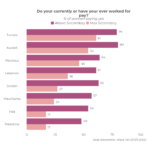We address a central question about the integration of developing countries into the global economy: what factors affect public support for such globalization. Do public preferences toward trade correlate with its economic consequences or sociocultural resonances? Using a nationally representative survey experiment in Tunisia, a majority Muslim, developing country, we investigate whether providing information about trade’s distributional consequences causes respondents to connect their economic self-interest to their trade policy preferences. Respondents seem to understand their economic self-interest, and information provision enhances this. Information about the likely benefits of trade causes people in the export-oriented sector to respond more positively to trade liberalization, as economic theory predicts. Information about its costs has confounding effects on those in import-competing sectors; those involved in global value chains maintain support for trade more than those outside such production chains who become protectionist. We find scant evidence that sociotropic, political, or cultural variables influence trade attitudes. Contributing to the recent debates over trade policy preferences, we show that public preferences align most strongly with their economic self-interest as derived from recent trade theories.
View External SiteTopics
- Charity2
- Corruption113
- COVID-1969
- Democracy35
- Discrimination13
- Economy225
- Education51
- Environment36
- Extremism19
- Freedoms50
- Gender Issues159
- Governance253
- Health44
- International Relations192
- Labor Market34
- Media31
- Migration63
- Political Institutions213
- Political Participation33
- Political Systems60
- Refugees6
- Religion118
- Security31
- Social Justice44
- Wellbeing2
- Youth75


